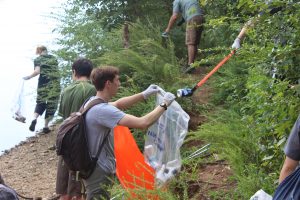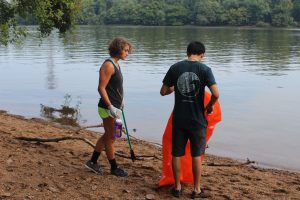It was a weird combination of excitement and discontent when I saw a piece of trash/garbage at the Dutch Gap. Initially, part of me saw every discarded item as a point, treating the whole river clean-up as a competition of who can fill their trash bags the fastest. However, the other part of me felt upset at the sheer amount of trash and neglect that was in the area. I kept thinking “How can people be so inconsiderate and lazy as to not even properly dispose of their own waste. Seeing items such as beer bottles, aluminum cans, and fishing lines especially fueled my anger towards these individuals. I didn’t know who specially was responsible for the litter and pollution, but seeing these specific items steered me to assume that they are ignorant and thoughtless characters who simply use the Dutch Gap in any way they please. It was so disheartening to finally clean up an area only to notice a piece of trash off the beaten path that when recovered, reveals another polluted area. I recall that me and Victoria (a member of “Out of the Sea”) both crawled through a thicket of shrubs and thorns, only tall enough for us to princess squat the whole time, in order to reach some of the denser areas in the Dutch. However, the hardest trash to recover was a bundle of tangled fish lines stuck on tree branches by the shore. I was waist deep in water trying to cut free the rope with only a dull key (I’d left my jack knife in the van) and finally ended up taking the whole branch with me because it was much too difficult.
It is important that we better enforce littering policy because the trash may potentially feed into the James River which is something Park Services, James River Association, and countless other volunteers are working to improve. The Dutch Gap is a very windy bend of the James River and, due to the calmer waters, is more vegetative. Thus, the trash and garbage that comes through this area is trapped in a bed of foliage and simply accumulates. Although this pollution may not be on the same scale as the mining and processing plants, individual littering is something that should not be overlooked. As Don Forsyth mentioned, gradual exposure and awareness of an issue influences behavior and ultimately turns into action. Proper recovery and sanitation should start at the local level and eventually move upwards. How will we ever solve the big problems if we can’t even get the little things right?



